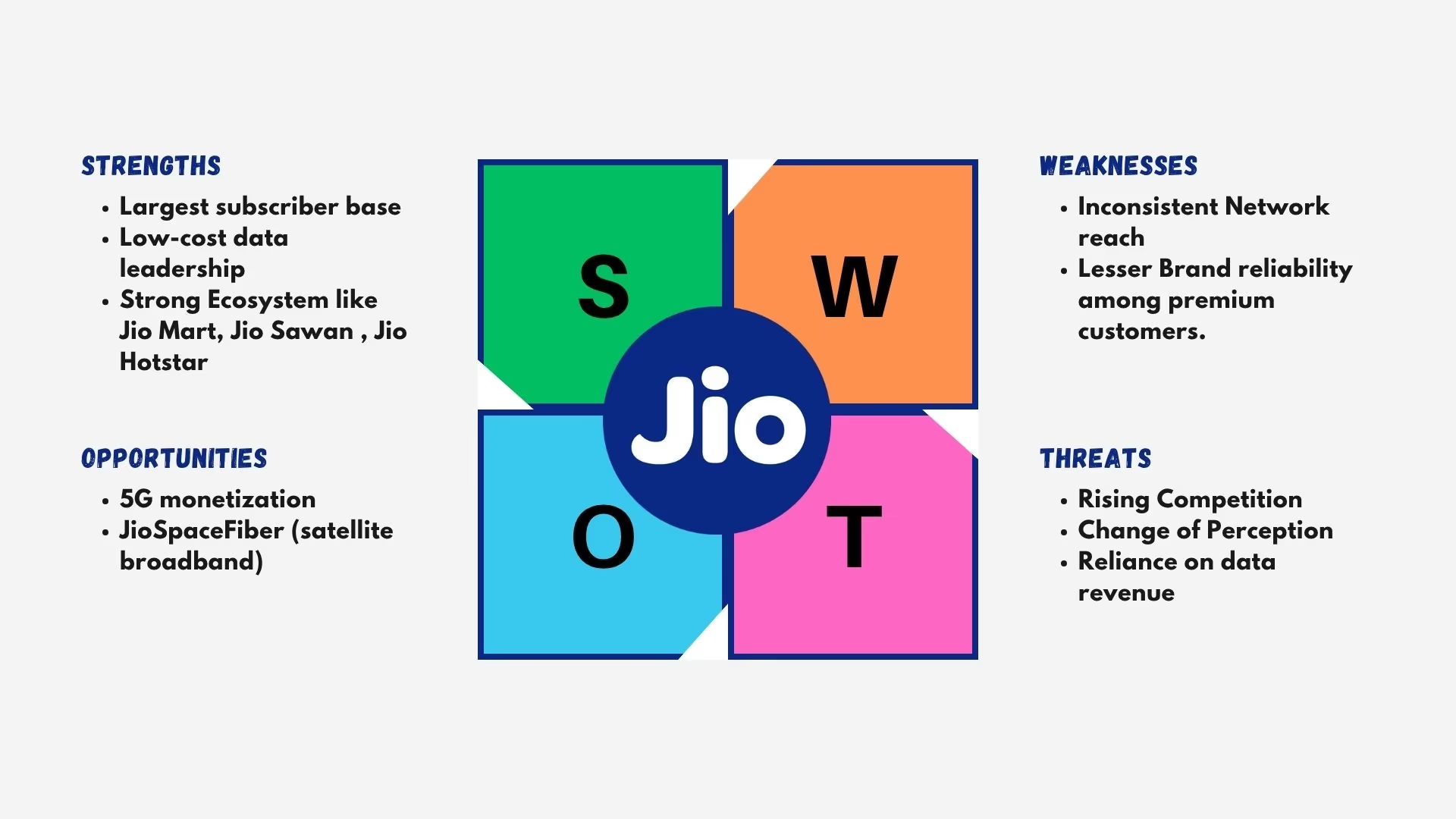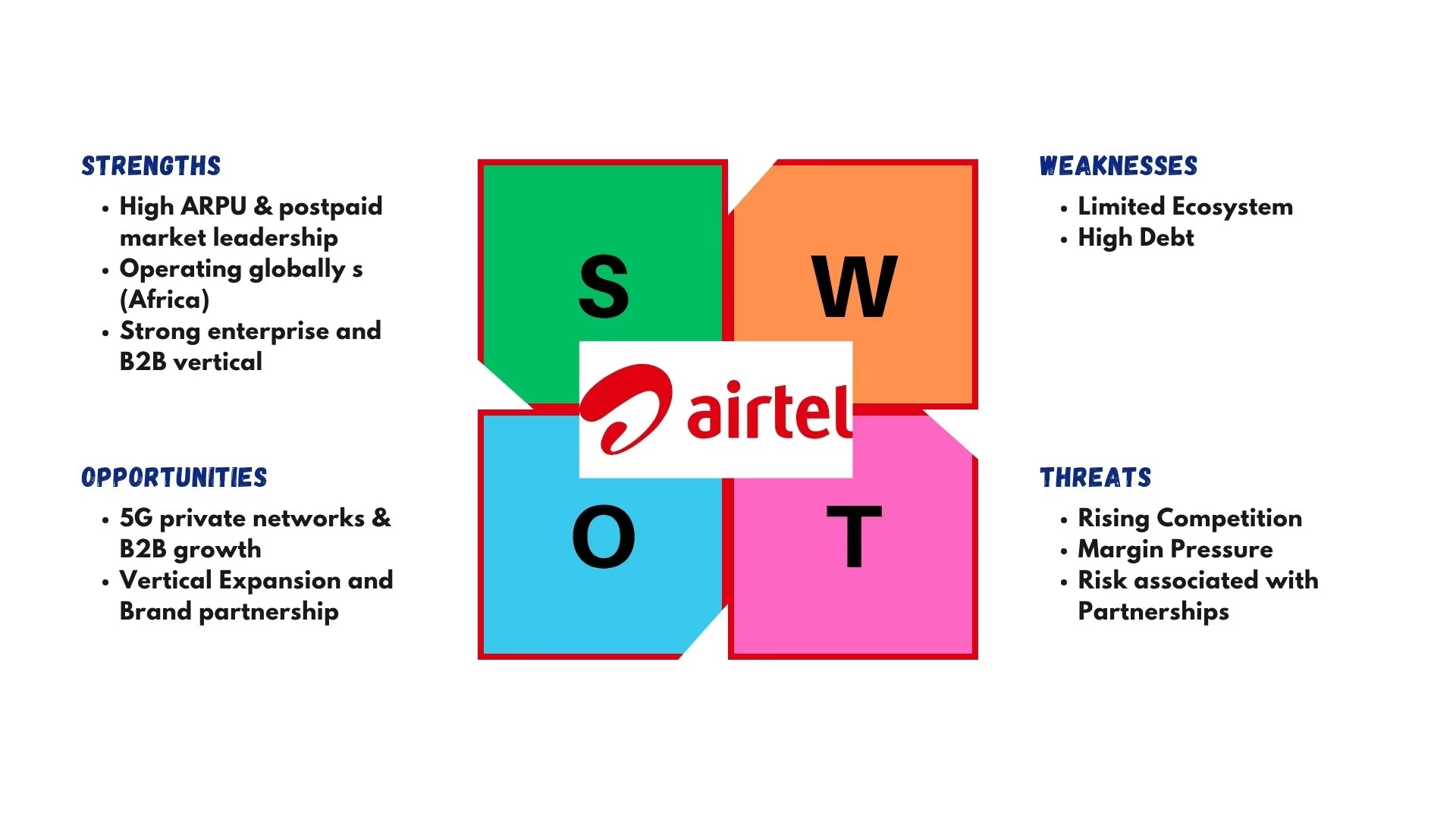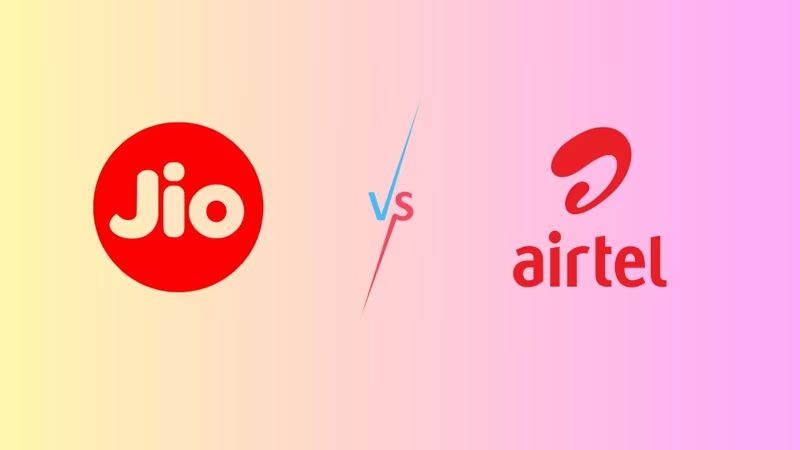Reliance Jio
Launched in 2016 by Reliance Industries, led by Mukesh Ambani, to disrupt the Indian telecom industry, which was earlier being dominated by traditional and sophisticated Indian telecom operators.
Jio made a dramatic debut by providing free voice and unlimited data with Jio Phones at incredibly low prices.
With cheaper prices, it disrupted the market by having the largest market share in the industry.
Airtel
Founded by Bharti Enterprises, led by Sunil Mittal, in 1995, it is one of the oldest and most reliable networks in the Indian telecom industry.
Airtel has built a reputation for network quality, reliability, and innovation. Over the years, Airtel has grown into a global telecom force, with operations across 18 countries in Asia and Africa.
The introduction of Jio has impacted Airtel’s market share, but Airtel’s counterattack is also commendable.
Overview of Jio vs Article plan categories
28 Days Validity Plans
| Feature | Jio | Airtel |
| Price | Rs. 349, Rs. 399, Rs. 449 | Rs. 199, Rs. 219, Rs. 299, Rs. 349, Rs. 409, Rs. 449, Rs. 549, Rs. 589, Rs. 609 |
| Data | 2GB/day, 2.5GB/day, 3GB/day | 2GB, 3GB, 28GB, 42GB, 2.5GB/day 84GB, 84GB, 50GB, 60GB |
| Additional benefits | Jio Apps | Wynk Music, Airtel Xstream |
56 Days Validity Plans
| Feature | Jio | Airtel |
| Price | Rs. 579-Rs. 629 | Rs. 838 |
| Data | 1.5GB/day, 2GB/day, 3GB/day | 168GB |
| Additional benefits | Jio Apps | Wynk Music, Amazon Prime, Airtel Xstream |
84 Days Validity Plans
| Feature | Jio | Airtel |
| Price | Rs. 719–Rs. 1,799 | Rs. 979, Rs. 1,199 |
| Data | 1.5GB/day, 2GB/day, 3GB/day | 168GB, 210GB |
| Additional benefits | Jio Apps | Wynk Music, Amazon Prime |
365 Days Validity Plans
| Feature | Jio | Airtel |
| Price | Rs. 3,599, Rs. 3,999 | Rs. 1,999, Rs. 3,599, Rs. 3,999 |
| Data | 2.5GB/day, 2.5GB/day | 24GB, 730GB, 912.5GB |
| Additional benefits | Jio Apps | Wynk Music, Disney+ Hotstar |
Reliance Jio
Launched in 2016 by Reliance Industries, led by Mukesh Ambani, to disrupt the Indian telecom industry, which was earlier being dominated by traditional and sophisticated Indian telecom operators.
Jio made a dramatic debut by providing free voice and unlimited data with Jio Phones at incredibly low prices.
With cheaper prices, it disrupted the market by having the largest market share in the industry.
Airtel
Founded by Bharti Enterprises, led by Sunil Mittal, in 1995, it is one of the oldest and most reliable networks in the Indian telecom industry.
Airtel has built a reputation for network quality, reliability, and innovation. Over the years, Airtel has grown into a global telecom force, with operations across 18 countries in Asia and Africa.
The introduction of Jio has impacted Airtel’s market share, but Airtel’s counterattack is also commendable.
Overview of Jio vs Article plan categories
28 Days Validity Plans
| Feature | Jio | Airtel |
| Price | Rs. 349, Rs. 399, Rs. 449 | Rs. 199, Rs. 219, Rs. 299, Rs. 349, Rs. 409, Rs. 449, Rs. 549, Rs. 589, Rs. 609 |
| Data | 2GB/day, 2.5GB/day, 3GB/day | 2GB, 3GB, 28GB, 42GB, 2.5GB/day 84GB, 84GB, 50GB, 60GB |
| Additional benefits | Jio Apps | Wynk Music, Airtel Xstream |
A Look at the Indian Telecom Industry
The Indian telecom industry serves as a backbone of our global communication, offering voice calls, data, and internet services through advanced networks like 5G, fiber optics, and satellite technologies.
With the increase of smartphones and rising internet demand, this sector is growth-driven for the future.
The Indian telecom industry is projected to be valued at USD 53 billion in 2025, with a target of USD 75 billion by 2030, reflecting a compound annual growth rate (CAGR) of 9.4% from 2024 to 2030.
It is predicted to have 920 million unique mobile subscribers by 2025, including 88 million 5G connections.
Brand Analysis
| Metric | Reliance Jio | Bharti Airtel |
| Market Share | 40.5% (approx.) | 33.6% (approx.) |
| Parent Group | Reliance Industries | Bharti Enterprises |
| Subscribers (2025) | 460 million | 390 million |
| Business Model | Mass market, digital ecosystem play | Premium user targeting, B2B diversification |
| Global Presence | Primarily India (expanding in Africa via RIL) | Operations in 18+ countries, including Africa |
Jio's focus is on building an ecosystem that aims to bundle content, commerce, finance, and fiber internet.
On the other hand, Airtel's focus is on doubling down on high-value customers, enterprise solutions, and fintech infrastructure (especially in Africa and rural India). The battle of brands needs to be watched out for.
Financial Snapshots
| Key Metric | Jio (Jio Platforms) | Airtel (Bharti Airtel) |
| Revenue | ₹1.35 lakh crore (Consolidated FY 25) | ₹1.73 lakh crore (FY 25 India ops) |
| EBITDA Margin | 50.1% in Q4, FY 25 | 57.2% in Q4, FY 25 |
| ARPU (average revenue per user) | ₹206/month | ₹245/month |
| Financial & Transactional Services | Jio Payments Bank and UPI integration through the My Jio app. | Airtel Payment Bank offers various services |
| Debt Level | Moderate (backed by RIL) | High (₹1.77 lakh cr, largely AGR dues) |
| Airtel plan vs Jio plan | ₹899 for 90 days | ₹979 for 84 days |
Save money in digital gold and build your wealth on the Jar app.
SWOT Analysis
Jio

Airtel

Brand Teardown
Comparison of Business Models
| Strategic Factor | Reliance Jio | Bharti Airtel |
| Market Entry Strategy | Aggressive disruption offering free voice calls and unlimited free data resulted in the emergence of a new market leader. | Organic growth over two decades, consolidated via strategic acquisitions (Telenor, Tata Tele) |
| Pricing Strategy | Primary focus on penetration pricing. Low pricing plans for mass scaling. | Premium pricing with higher network quality, postpaid value, and OTT bundling |
| Tech & Infra Strategy | First to roll out standalone 5G (SA) owns end-to-end infra via JioFiber & Reliance Infratel | Non-standalone 5G (NSA) for faster rollout; shares infra via Indus Towers; investing in private 5G |
| Ecosystem Play | Super-app model: JioHotstar (merger of Hotstar and Jio Cinema), JioMart, JioSaavn, JioFinance, JioTV, JioCloud | Core telecom & financial services: Airtel Thanks app, Airtel Payments Bank, Wynk, Xstream |
| Digital Content Strategy | Own OTT platform (JioCinema) | OTT aggregator model: Partner with OTT platforms. |
| Enterprise/B2B Play | Early-stage enterprise focus (5G IoT, JioAirFiber, SmartCity projects) but largely consumer-led | Strong B2B play: Nxtra Data Centers, Airtel IQ, private 5G networks |
| Brand Personality | Bold and disruptive with an aim to have high reach among youth | Reliable, premium, urban-friendly, appeals to high-ARPU and enterprise clients |
| Growth and Partnership | Aggressive expansion into different sectors like E-commerce, IoT, and healthcare. | Strategic expansion targeting premium customers with strong partnerships with AWS, Google Cloud, etc. |
Bottom Line
In short, Jio emerged as a market disruptor when launched with an aim to penetrate the mass market with cheap and aggressive pricing models and the development of an ecosystem with it.
On the other hand, Airtel has been a giant for ages in the Indian telecom market and for decades has quite impressively handled Jio’s strategy.
This is a classic case of differentiated positioning in a maturing duopoly, where value creation is shifting from subscriber acquisition to ecosystem control and service bundling.
Both companies have their loyal user bases, but the increasing use of high-speed data is changing the competitive landscape. The telecom market will be in the limelight over the years.
A Look at the Indian Telecom Industry
The Indian telecom industry serves as a backbone of our global communication, offering voice calls, data, and internet services through advanced networks like 5G, fiber optics, and satellite technologies.
With the increase of smartphones and rising internet demand, this sector is growth-driven for the future.
The Indian telecom industry is projected to be valued at USD 53 billion in 2025, with a target of USD 75 billion by 2030, reflecting a compound annual growth rate (CAGR) of 9.4% from 2024 to 2030.
It is predicted to have 920 million unique mobile subscribers by 2025, including 88 million 5G connections.
Brand Analysis
|
Metric |
Reliance Jio |
Bharti Airtel |
|
Market Share |
40.5% (approx.) |
33.6% (approx.) |
|
Parent Group |
Reliance Industries |
Bharti Enterprises |
|
Subscribers (2025) |
460 million |
390 million |
|
Business Model |
Mass market, digital ecosystem play |
Premium user targeting, B2B diversification |
|
Global Presence |
Primarily India (expanding in Africa via RIL) |
Operations in 18+ countries, including Africa |
Jio's focus is on building an ecosystem that aims to bundle content, commerce, finance, and fiber internet.
On the other hand, Airtel's focus is on doubling down on high-value customers, enterprise solutions, and fintech infrastructure (especially in Africa and rural India). The battle of brands needs to be watched out for.
Financial Snapshots
|
Key Metric |
Jio (Jio Platforms) |
Airtel (Bharti Airtel) |
|
Revenue |
₹1.35 lakh crore (Consolidated FY 25) |
₹1.73 lakh crore (FY 25 India ops) |
|
EBITDA Margin |
50.1% in Q4, FY 25 |
57.2% in Q4, FY 25 |
|
ARPU (average revenue per user) |
₹206/month |
₹245/month |
|
Financial & Transactional Services |
Jio Payments Bank and UPI integration through the My Jio app. |
Airtel Payment Bank offers various services |
|
Debt Level |
Moderate (backed by RIL) |
High (₹1.77 lakh cr, largely AGR dues) |
|
Airtel plan vs Jio plan |
₹899 for 90 days |
₹979 for 84 days |
Save money in digital gold and build your wealth on the Jar app.
SWOT Analysis
Jio

Airtel

Brand Teardown
Comparison of Business Models
|
Strategic Factor |
Reliance Jio |
Bharti Airtel |
|
Market Entry Strategy |
Aggressive disruption offering free voice calls and unlimited free data resulted in the emergence of a new market leader. |
Organic growth over two decades, consolidated via strategic acquisitions (Telenor, Tata Tele) |
|
Pricing Strategy |
Primary focus on penetration pricing. Low pricing plans for mass scaling. |
Premium pricing with higher network quality, postpaid value, and OTT bundling |
|
Tech & Infra Strategy |
First to roll out standalone 5G (SA) owns end-to-end infra via JioFiber & Reliance Infratel |
Non-standalone 5G (NSA) for faster rollout; shares infra via Indus Towers; investing in private 5G |
|
Ecosystem Play |
Super-app model: JioHotstar (merger of Hotstar and Jio Cinema), JioMart, JioSaavn, JioFinance, JioTV, JioCloud |
Core telecom & financial services: Airtel Thanks app, Airtel Payments Bank, Wynk, Xstream |
|
Digital Content Strategy |
Own OTT platform (JioCinema) |
OTT aggregator model: Partner with OTT platforms. |
|
Enterprise/B2B Play |
Early-stage enterprise focus (5G IoT, JioAirFiber, SmartCity projects) but largely consumer-led |
Strong B2B play: Nxtra Data Centers, Airtel IQ, private 5G networks |
|
Brand Personality |
Bold and disruptive with an aim to have high reach among youth |
Reliable, premium, urban-friendly, appeals to high-ARPU and enterprise clients |
|
Growth and Partnership |
Aggressive expansion into different sectors like E-commerce, IoT, and healthcare. |
Strategic expansion targeting premium customers with strong partnerships with AWS, Google Cloud, etc. |
Bottom Line
In short, Jio emerged as a market disruptor when launched with an aim to penetrate the mass market with cheap and aggressive pricing models and the development of an ecosystem with it.
On the other hand, Airtel has been a giant for ages in the Indian telecom market and for decades has quite impressively handled Jio’s strategy.
This is a classic case of differentiated positioning in a maturing duopoly, where value creation is shifting from subscriber acquisition to ecosystem control and service bundling.
Both companies have their loyal user bases, but the increasing use of high-speed data is changing the competitive landscape. The telecom market will be in the limelight over the years.










